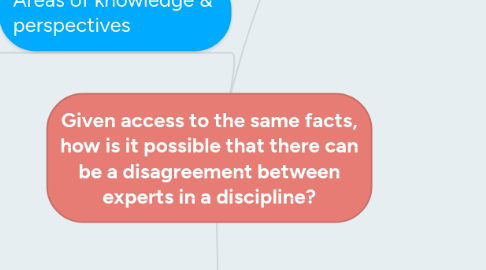
1. Areas of knowledge & perspectives
1.1. natural sciences
1.1.1. newton vs his contemporaries
1.1.2. newton had the same access to facts
1.1.3. but newton comes up with his new theories and his contemporaries didnt
1.1.4. newtons theories werent accepted as a different school of thought for hundreds of years, merely just a counter theory that was disregarded
1.2. human sciences
1.2.1. economics
1.2.2. demand side policies - Keynesian
1.2.3. 1930s - to understand the Great Depression, Keynes increased government expenditures and lower taxes to stimulate demand and pull the global economy out of the Depression
1.2.4. supply side policies neo classical
1.2.5. 1900, based on books by William Stanley Jevons, Carl Menger and Leon Walras, and became popular in the early 20th century.
1.3. arts
1.3.1. what is considered art
1.3.2. contemporary art vs historic art
1.3.3. conceptual thoughts behind a simplistic piece
1.3.4. craftsmanship, a skilled artist - 19th century
1.4. history
1.4.1. conflicts with no concrete start/end date
1.4.2. cold war
1.4.3. conflicts main/first influence
1.4.4. first world war - prins ferdinand: straw that broke the camels back
1.5. human sciences vs ethics/religious knowledge
1.5.1. chinas one child policy
1.5.2. is it ethical to limit ones personal wish for certain amount of children
1.5.3. practical reasons - unable to provide for the large amount of people
1.5.4. without policy: possibility - parents would have been able to have as many children but they would not have grown up in an optimal environment
1.5.5. consequences of policy: mass abortions of girls --> marriage problems in 2010's
1.5.6. christianity: as many children as possible
1.5.7. being the only child effects the nurturing of the child: less tolerant of others
1.6. natural sciences vs religious knowledge
1.6.1. human evolution
1.6.2. gods bible
1.6.3. theory of evolution
1.6.4. religious interpretations
1.6.5. science theories/facts
1.7. natural sciences vs indigenous knowledge
1.7.1. explanation of weather
1.7.2. scientific climate patterns
1.7.3. myths and legends with gods, greek
1.7.4. modern day: global warming
2. Knowledge questions (developed)
2.1. how can experts with access to the same facts draw different conclusions?
2.1.1. different background knowledge?
2.1.2. different analysis of data?
2.1.3. different justification of correctness/validity of facts?
2.1.4. following a certain accepted theorist?
2.2. what does it mean to gain knowledge?
2.2.1. from no knowledge to personal knowledge
2.2.2. it takes more than facts to gain knowledge
2.3. what process of validity and justification is undergone before accepting facts a whole school of thought?
2.3.1. from personal to shared knowledge
2.4. how can multiple schools of thought come to acceptingly co-exist within an oak?
2.5. what is an expert?
2.5.1. shared knowledge - an accepted person
2.5.2. authority
2.5.3. valued opinions
2.6. two aok dont necesairily oppose but contrast in theories over the same discipline
2.6.1. aok that like to get up in other oaks business:
2.6.2. natural sciences
2.6.3. indigenous knowledge
2.6.4. religious knowledge
3. Ways of knowing
3.1. emotion
3.1.1. personal gain
3.1.2. personal connection to certain things
3.1.3. emotionally involved in something where objectivity is really required
3.1.4. we are humans not robots
3.2. faith
3.2.1. sometimes no direct justification for our actions
3.2.2. impulse
3.2.3. believe in certain authority figure who may or maynot be correct
3.2.4. corruptness - faith in wrong person
3.3. imagination
3.3.1. everything works in our favour
3.3.2. not a realistic sight
3.3.3. imagine what could be possibly - not everything is realisticly justified
3.3.4. "some may say im a dreamer, but im not the only one"
3.4. intuition
3.4.1. with background knowledge
3.4.2. intuition within a certain aok
3.4.3. if you are very mathematically capable your intuition with lie with mathematical theory as background
3.5. language
3.5.1. people need to communicate
3.5.2. communicate their personal knowledge in order for it to become shared knowledge
3.5.3. language is key in order for knowledge to develop
3.6. memory
3.6.1. remembrance of previous knowledge helps us move forward in a certain area of knowledge
3.6.2. without building on past knowledge we are in a spiral, dont really get anywhere
3.7. reason
3.7.1. eventhough this is supposed to be general and unpersonal, many people draw their reasoning to benefit themselves and their beliefs
3.7.2. justification for their own actions
3.7.3. overlooking 'clear' problems
3.8. sense perception
3.8.1. way in which you approach something
3.8.2. prejudice

